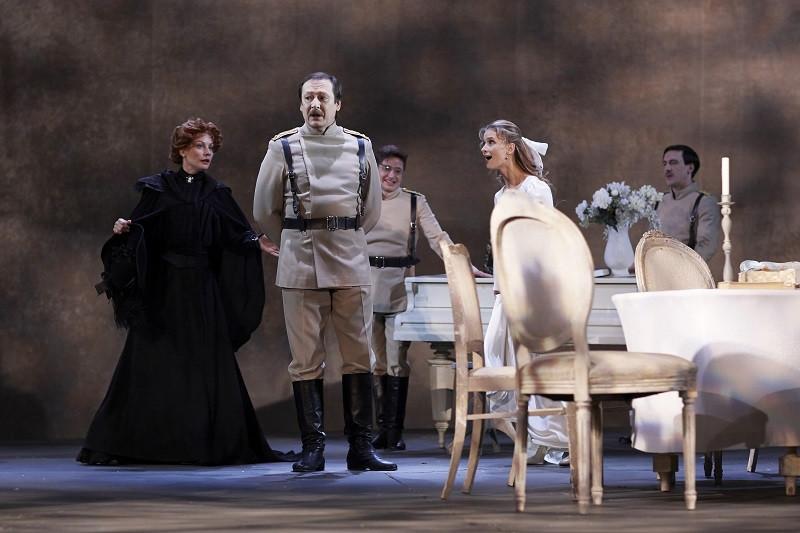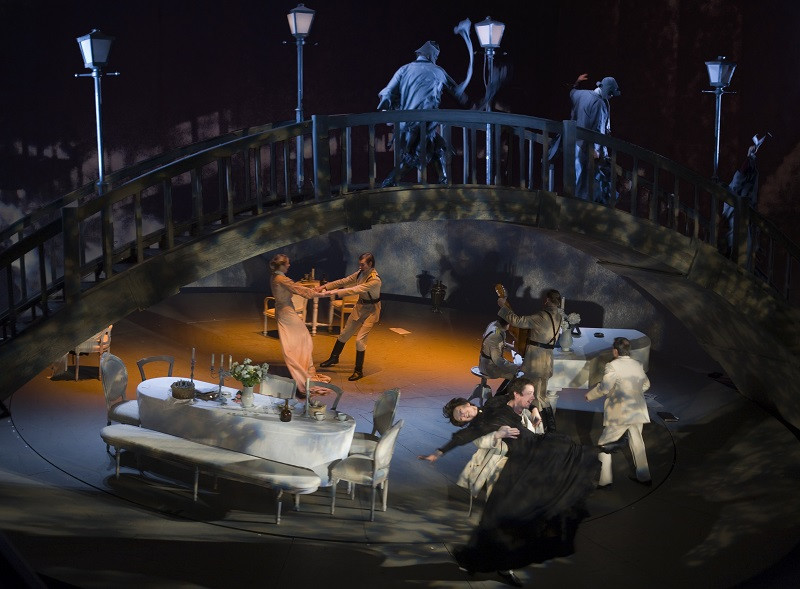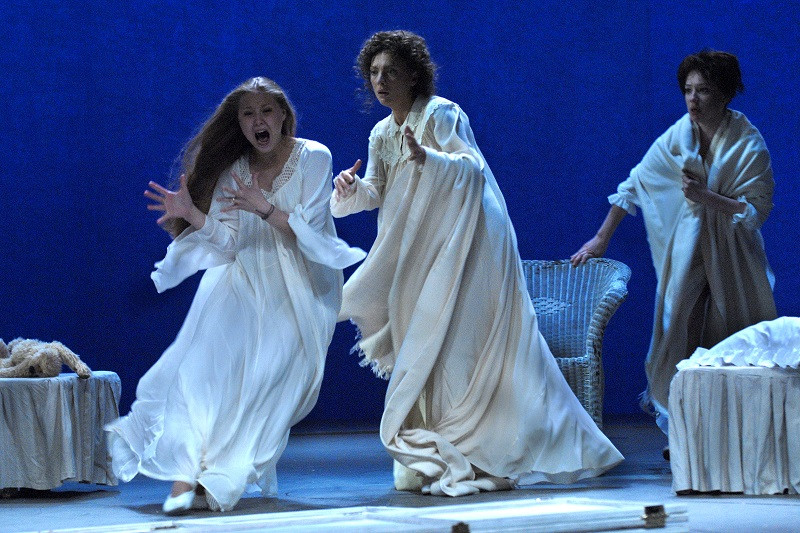Three Sisters, Sovremennik review - over-conscious of its legendariness | reviews, news & interviews
Three Sisters, Sovremennik review - over-conscious of its legendariness
Three Sisters, Sovremennik review - over-conscious of its legendariness
Celebrated Moscow company makes Chekhov far from contemporary

Sovremennik is Russian for “contemporary”, and ever since its founding in the Soviet Union's 1950s Thaw, Moscow’s Sovremennik Theatre company has lived by the idea that it expresses new, fresh breath in Russian theatre. Unless you argue that the adjective “contemporary” by definition must reveal characteristics of its temporal surroundings, moribund is not one of the alternative meanings of the word.
I find it hard to see it positively. This stolid production feels over-conscious of the legendariness of its name and the play. The conventions seem to date from half a century ago, when Volchek was one of the Sovremennik's founding actors (she's now 83), and archetypes have been milled by luminaries to hand down to new generations.
But surely Chekhov's restless, frozen, claustrophobic 1900 drama is all about intimacies, whether sought or not, and about the imprisonment of identities in the moment. Whether the viewer feels desperate on behalf of the younger generation who will never make it to Moscow depends on the actors making us intuit the suffocating immediacy of those family bonds and social obligations - a genuine sense that “contemporary” means now.
I was puzzled at the absence of credible relationships (impossible for me not to remember the miraculous Cusack family performance at the Gate, Dublin, 20-odd years ago) and a widespread sense of something embalmed, an enactment by numbers of the holy ritual that is Chekhov. All the stranger considering the premium the Sovremennik put in their publicity on the emotional credibility in their style, so possibly my unresponsiveness must indicate a simple culture gap. The staging, suggesting Chekhov’s period, hovers between symbolism and naturalism. Against a foggy grey background a garden bridge arches high over an open floor on which elegant white 19th-century furniture is grouped on a revolve to indicate drawing room, dining room, bedroom, all of which whirls distractingly around between scenes like a carousel (the mise-en-scène pictured above). Against the dessicated costume palette — white, black, grey for women, mostly light khaki uniforms for the men — the pink satin favoured by the sisters’ new sister-in-law Natalia shrieks obviously of her lower class.
The staging, suggesting Chekhov’s period, hovers between symbolism and naturalism. Against a foggy grey background a garden bridge arches high over an open floor on which elegant white 19th-century furniture is grouped on a revolve to indicate drawing room, dining room, bedroom, all of which whirls distractingly around between scenes like a carousel (the mise-en-scène pictured above). Against the dessicated costume palette — white, black, grey for women, mostly light khaki uniforms for the men — the pink satin favoured by the sisters’ new sister-in-law Natalia shrieks obviously of her lower class.
The whole thing seems over-planned and under-imagined. To constrict the action inside just two sections of the stage, the circle in the middle or the bridge overhead, does certainly spell out a thematic contrast between down-to-earth reality and head-in-the-clouds hopes, but it sets a considerable challenge to actors to look as if they lived there, rather than were finding it all rather awkward.
The players dashed on for their scene, rushed around each other animatedly as they conversed, and strode importantly to front of stage to deliver their reflections on life to us. More like grand opera - as if roles had been preformed and the actors instructed according to their ranking, rather than developed from inside genuine human psyches: Chebutykin as a comic-book old drunk was a particular bore (RIP Cyril Cusack), and the capricious missishness of Alyona Babenko’s Masha made her character very difficult to like or believe in. Sergei Yushkevich's Kulygin was not so irritating a husband as to make the pompous Vershinin of Vladislav Vetrov impossible to resist.

Vocal underprojection was also a general problem, even in the small Piccadilly Theatre. Olga Drozdova’s Olga was a major offender in this, and a generous oversupply of birdsong on tape and very bright surtitle screens did not mitigate it (especially when titles broke down at climactic moments). By contrast the elderly Yelena Millioti as nurse Anfisa, another historic Sovremennik member, gave an object lesson in clarity.
Still, even if one felt little connection with the sisters’ personal tragedies, not quite all Chekhovian heart was lost. I did respond to some genuine poignancy in the playing of their disappointing brother Andrei Prozorov, his weakness made likeable and credible by Ilya Lykov. Most of all Yelena Plaksina touchingly showed in his bustling wife, Natalia, the damage of her social elevation, as she turned from the bright-faced, rather appealing fiancée of Act 1 into a grasping, spoiled wife. Plaksina, larger than life in her vulgar pink dress and curls, was contemporary.
The future of Arts Journalism
You can stop theartsdesk.com closing!
We urgently need financing to survive. Our fundraising drive has thus far raised £49,000 but we need to reach £100,000 or we will be forced to close. Please contribute here: https://gofund.me/c3f6033d
And if you can forward this information to anyone who might assist, we’d be grateful.

Subscribe to theartsdesk.com
Thank you for continuing to read our work on theartsdesk.com. For unlimited access to every article in its entirety, including our archive of more than 15,000 pieces, we're asking for £5 per month or £40 per year. We feel it's a very good deal, and hope you do too.
To take a subscription now simply click here.
And if you're looking for that extra gift for a friend or family member, why not treat them to a theartsdesk.com gift subscription?
more Theatre
 Othello, Theatre Royal, Haymarket review - a surprising mix of stateliness and ironic humour
David Harewood and Toby Jones at odds
Othello, Theatre Royal, Haymarket review - a surprising mix of stateliness and ironic humour
David Harewood and Toby Jones at odds
 Macbeth, RSC, Stratford review - Glaswegian gangs and ghoulies prove gripping
Sam Heughan's Macbeth cannot quite find a home in a mobster pub
Macbeth, RSC, Stratford review - Glaswegian gangs and ghoulies prove gripping
Sam Heughan's Macbeth cannot quite find a home in a mobster pub
 The Line of Beauty, Almeida Theatre review - the 80s revisited in theatrically ravishing form
Alan Hollinghurst novel is cunningly filleted, very finely acted
The Line of Beauty, Almeida Theatre review - the 80s revisited in theatrically ravishing form
Alan Hollinghurst novel is cunningly filleted, very finely acted
 Wendy & Peter Pan, Barbican Theatre review - mixed bag of panto and comic play, turned up to 11
The RSC adaptation is aimed at children, though all will thrill to its spectacle
Wendy & Peter Pan, Barbican Theatre review - mixed bag of panto and comic play, turned up to 11
The RSC adaptation is aimed at children, though all will thrill to its spectacle
 Hedda, Orange Tree Theatre review - a monument reimagined, perhaps even improved
Scandinavian masterpiece transplanted into a London reeling from the ravages of war
Hedda, Orange Tree Theatre review - a monument reimagined, perhaps even improved
Scandinavian masterpiece transplanted into a London reeling from the ravages of war
 The Assembled Parties, Hampstead review - a rarity, a well-made play delivered straight
Witty but poignant tribute to the strength of family ties as all around disintegrates
The Assembled Parties, Hampstead review - a rarity, a well-made play delivered straight
Witty but poignant tribute to the strength of family ties as all around disintegrates
 Mary Page Marlowe, Old Vic review - a starry portrait of a splintered life
Tracy Letts's Off Broadway play makes a shimmeringly powerful London debut
Mary Page Marlowe, Old Vic review - a starry portrait of a splintered life
Tracy Letts's Off Broadway play makes a shimmeringly powerful London debut
 Little Brother, Soho Theatre review - light, bright but emotionally true
This Verity Bargate Award-winning dramedy is entertaining as well as thought provoking
Little Brother, Soho Theatre review - light, bright but emotionally true
This Verity Bargate Award-winning dramedy is entertaining as well as thought provoking
 The Unbelievers, Royal Court Theatre - grimly compelling, powerfully performed
Nick Payne's new play is amongst his best
The Unbelievers, Royal Court Theatre - grimly compelling, powerfully performed
Nick Payne's new play is amongst his best
 The Maids, Donmar Warehouse review - vibrant cast lost in a spectacular-looking fever dream
Kip Williams revises Genet, with little gained in the update except eye-popping visuals
The Maids, Donmar Warehouse review - vibrant cast lost in a spectacular-looking fever dream
Kip Williams revises Genet, with little gained in the update except eye-popping visuals
 Ragdoll, Jermyn Street Theatre review - compelling and emotionally truthful
Katherine Moar returns with a Patty Hearst-inspired follow up to her debut hit 'Farm Hall'
Ragdoll, Jermyn Street Theatre review - compelling and emotionally truthful
Katherine Moar returns with a Patty Hearst-inspired follow up to her debut hit 'Farm Hall'
 Troilus and Cressida, Globe Theatre review - a 'problem play' with added problems
Raucous and carnivalesque, but also ugly and incomprehensible
Troilus and Cressida, Globe Theatre review - a 'problem play' with added problems
Raucous and carnivalesque, but also ugly and incomprehensible

Add comment